Ever wonder what is the best oil to use in cooking? You’ve probably heard that olive oil is great for your heart, but is olive oil good for diabetes?
Olive oil has been used in the Mediterranean diet for thousands of years and has been boasted to be a longevity food. It’s known to boost flavor, along with adding crust and visual appeal to our favorite dishes. But what’s in the olive oil that makes it so special and is it a unique advantage?
In this post, we will unveil olive oil’s nutrition facts, its benefits, and whether it’s a good oil for diabetes.
DISCLAIMER: This post was written by Justine Chan MHSc, RD, CDE. All content on this site is for informational purposes only and is not a substitute for professional medical or nutritional advice. Always seek medical and dietary advice from your doctor or dietitian.
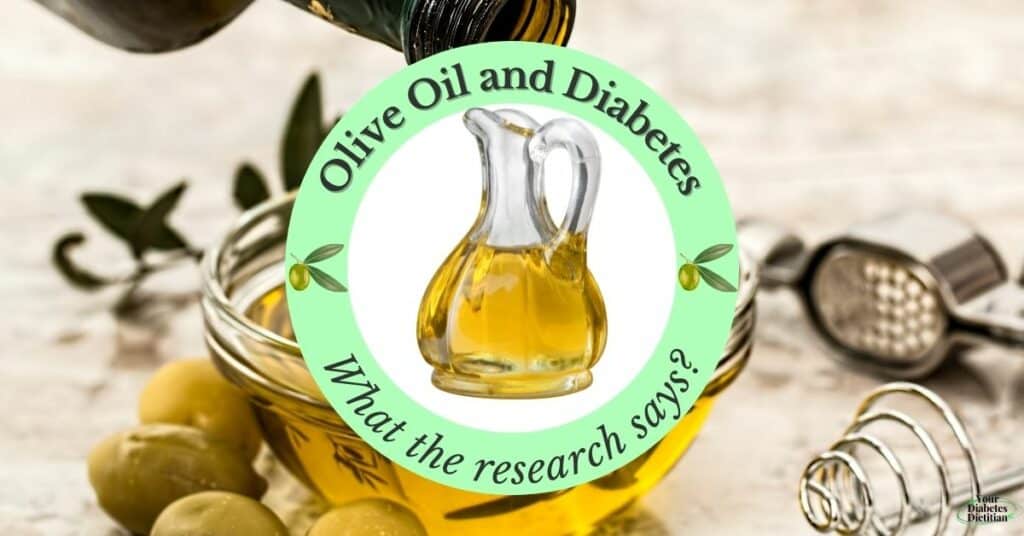
Table of Contents
Olive Oil Nutrition
One tablespoon of olive oil contains:
- 119 kcal
- 13 grams of fat
- 0 grams of carbohydrate
- 0 grams of protein
- 2 milligrams of vitamin E (13% Daily Value)
- 8 micrograms of vitamin K (7% Daily Value)
- 10 grams of monounsaturated, 1 gram polyunsaturated and 2 grams of saturated fat
The nutrition profile of olive oil is impressive. With 11 grams of unsaturated fat and only 2 grams of saturated fat, these are the qualities you want to see in an oil. But how does it compare nutrition-wise to other oils?
| Oil (per tablespoon) | Olive oil | Canola oil | Avocado oil |
| Calories (kcal) | 119 | 124 | 124 |
| Fat (g) | 13 (85% unsaturated) | 14 (93% unsaturated) | 14 (86% unsaturated) |
| Carbohydrates (g) | 0 | 0 | 0 |
| Protein (g) | 0 | 0 | 0 |
| Vitamin E (mg) | 2 | 2 | 2 |
| Vitamin K (ug) | 8 | 10 | 13 |
As you can see, the vitamin content in the oils is quite similar. Oils are 100% fat, so they also have no carbohydrate or protein content. The fat in olive oil and its comparators are all at least 85% unsaturated, which is the healthy kind for your heart.
Oleic acid is a type of monounsaturated fat that’s highest in olive oil and nuts (1). More of these types of fats in your diet may help to improve your body’s use of insulin compared to high carbohydrate, high protein or low fat diets (2). Check out this post on almond flour for more benefits.
Extra virgin olive oil has the most phenolic compounds. These compounds are believed to be the main contributor of its health benefits. Phenolic compounds act like antioxidants and prevent cell damage, fighting diseases like cancer and heart disease (3).
Types of Olive Oil
There are two main types of olive oil:
- Extra virgin oil – highest in antioxidants, vitamins, and minerals (4)
- Olive oil, also known as regular, light
All types of olive oil will provide good amounts of heart healthy fats. However, as discussed above, the research around the antioxidant benefits of olive oil is concentrated on extra virgin olive oil. This is the type you want to buy to get the most antioxidants and flavor.
According to the International Olive Council, extra virgin olive oil is oil from olives that has not been chemically treated or heated by any means.
Can olive oil be used for diabetes?
Yes! Olive oil is good for diabetes because it is a low glycemic food (4). It has no carbohydrates and generally won’t raise your blood sugar on its own, especially since it is typically consumed in small amounts.
We need to keep this in context however. After all, do we typically have olive oil on its own? You may have heard the latest celebrity trend is drinking olive oil, but for most of us, it’s often added to our most loved dishes. So while the oil may not affect our blood sugars, what we eat with it will make an impact.
What the research says
Diabetes prevention and heart health
In people without diabetes, adding olive oil to a Mediterranean-type of meal is associated with lower cholesterol and blood sugars (5). This may be because olive oil is high in monounsaturated fats (4).
When you look at Nurses Health studies that followed women over the course of 22 years, those who had greater than one tablespoon of olive oil daily had a 10% lower risk of developing type 2 diabetes compared to those without it (2). In one of the largest and longest randomized controlled trials on the effects of the Mediterranean Diet and heart disease, there was a 30% lower risk compared to a low-fat diet (6, 7).
The polyphenols in extra virgin olive oil have also been shown to reduce bad cholesterol and boost good cholesterol (4). These polyphenols may also boost nitric oxide production, thereby helping to improve blood pressure (4).
Type 1 diabetes
People with type 1 diabetes often have a delayed blood sugar spike from higher fat meals that also contain carbs like pizza, ice cream, etc. This is because dietary fat delays the blood sugar spike.
Insulin dosing can be customized to account for this delayed spike (8). It often requires trial and error and can be frustrating to figure out.
But how does olive oil affect blood sugars compared to other fats?
A 2020 randomized controlled trial involving people with type 1 diabetes using an insulin pump found the quantity of fat was what had an effect rather than the type of fat (8). However, another trial found that extra virgin olive oil helped to lower blood sugars after a high glycemic index meal (9).
So which study should we believe? Well, both of these studies had small sample sizes and were short in length so we can’t take much from either.
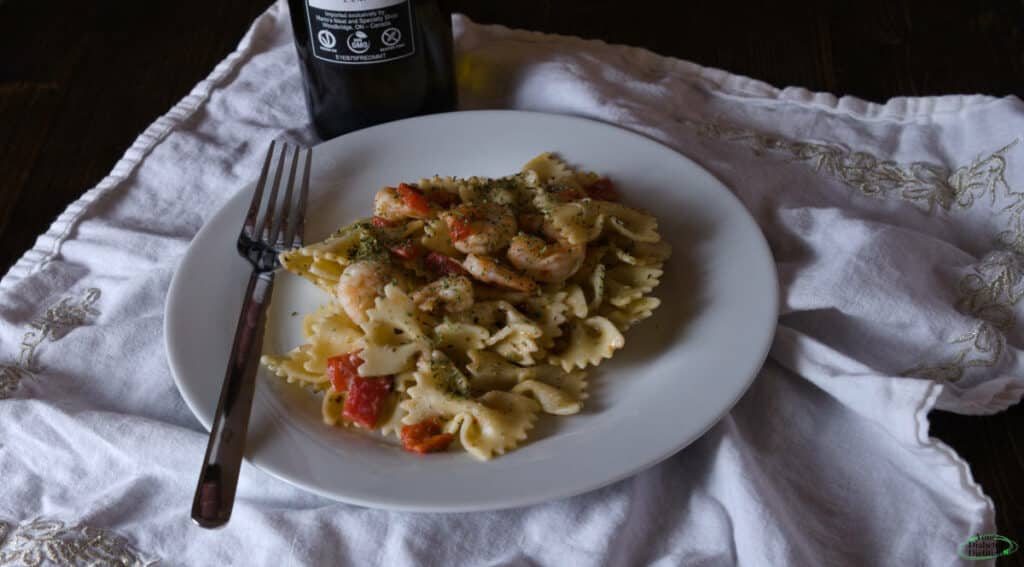
Health benefits
Antioxidant and anti-inflammatory benefits
Olive oil is high in polyphenols which act like antioxidants and have anti-inflammatory benefits (1). Antioxidants help prevent cell damage and slow the aging process. Even though cooking can reduce antioxidants, it has been shown that they are still absorbed into the food (10).
Lower inflammation means a lower risk for chronic diseases, including diabetes and heart disease. Having olive oil as a part of your diet may help prevent and manage other diseases and conditions like cancer and infections (1). This will help you live your best life!
Increases absorption of fat-soluble nutrients
Cooking with olive oil can increase the absorption of carotenoids and polyphenols, both of which can prevent cell damage, fight off disease, and promote healthy aging (11). The neat thing is that when you cook with olive oil, both the food and the oil are enriched with beneficial compounds. It’s a win-win!
Changes your gut bacteria
Olive oil may increase bifidobacteria, a bacteria that lives in your gut. It is this type of bacteria that may be beneficial for your heart and lower cholesterol (12).
May reduce risk of diabetes complications
Worried about developing diabetes complications? Diabetes can affect your heart, kidneys, eyes, and nerves.
A large study interviewing over 80,000 women found that a mix of foods high in monounsaturated fats like olive oil, avocado, nuts and seeds and low glycemic index carbs was associated with a reduced risk of heart disease (13). Supplementing with olive oil or nuts has been shown to lower risk of heart disease by 30% (13).
How? It’s believed that olive oil may lower cholesterol and blood pressure (12).
As a major component of the Mediterranean eating pattern, both olive oil and nuts can reduce your risk of retinopathy, which is damage to the back of your eye and is a common diabetes complication (14).
All that’s to say, is that looking after your heart and keeping your blood pressure and cholesterol in check opens up your arteries. This means better blood flow and circulation and ultimately, healthier organs.
May reduce your risk of cancer
Olive oil has been shown to be associated with a lower risk of cancer. Breast cancer risk was lower in participants who followed a Mediterranean diet high in olive oil over the long term (3).
May promote a longer life
In our world’s Blue Zones, areas where people live the longest, olive oil is the most commonly used oil. For example, people in Ikaria outlive Americans by 8 years (15). If you ask them what they eat on a consistent basis, they’ll tell you their diet consists of whole grains, fruits and vegetables, beans, potatoes, and of course, olive oil.
Which oil is best for people with diabetes?
The best way to ensure you achieve a balance when it comes to oils and fats is to incorporate a variety of plant-based oils.
Here are some that I recommend on a routine basis to my clients because they are high in monounsaturated and polyunsaturated fats, as well as essential fats like omega 3s:
- Extra virgin olive oil
- Avocado oil
- Walnut oil
- Flaxseed oil
- Canola oil
Getting enough omega 3s in your diet is important, since your body can’t make them on its own. Walnut, flaxseed, and canola oil are great sources of omega 3s.
Cooking with olive oil
Cooking with olive oil can increase the absorption of carotenoids and polyphenols, both of which can prevent cell damage, fight off disease, and promote healthy aging
Justine Chan, RD, CDE, MHSc
Did you know that smoke point is actually an irrelevant indicator for cooking? Smoke point is the temperature at which bluish smoke appears after heating a small amount of oil on an aluminum plate constantly.
According to the North American Olive Oil Association, extra virgin olive oil’s smoke point is 390-410F, which falls within the average smoke top temperature of 350F.
Historically, it was believed that a low smoke point meant that the oil easily broke down when heated, resulting in off-flavors, loss of nutrients and the release of potentially harmful compounds.
Now, it’s believed that the stability of the oil is more important.
Extra virgin olive oil has been shown to be more stable and actually less likely to break down and produce harmful byproducts compared to other seed oils (10, 16). This is great news! There is no harm in frying foods with olive oil.
Since it is high in monounsaturated fats, it is less prone to oxidation or its breakdown. Also, its antioxidants are thought to be protective against its degradation during cooking.
How to add olive oil to your diet
Olive oil can be used in many ways:
- As a salad dressing mixed with vinegar
- Drizzled on top of fresh tomatoes, basil and cheese
- In a stir fry with chicken and vegetables
- Tossed with your favorite vegetables to roast in the oven
- As a cooking oil
- As a base for a marinade
- Drizzled over your favorite grain or protein for a flavor burst
- As a finisher for condiments such as hummus and dips
Storage
Keep olive oil in a tinted bottle in a cool, dark place. Once opened, try to use it within 3 months. You’ll know if olive oil is bad if it smells or tastes off.
How much olive oil should someone with diabetes have in a day?
The concentration of nutrients and beneficial health properties of extra virgin olive oil depend on many factors, including the type of olive and its stage of ripening, climate and soil conditions, how the oil was separated, as well as time and how it was stored (3).
Therefore, olive oil can’t be standardized and it’s hard to know the exact amount you need for health (3). In the many studies I’ve read, 10 grams of olive oil was the most common dose added to a meal. This is about a tablespoon or the tip of your thumb.
But when it comes to a healthy heart, it’s more important to focus on the quality of fats in your diet rather than the quantity.
Possible side effects
Too much olive oil and fats in your diet can cause weight gain. Fats such as olive oil provide 9 calories per gram, while carbohydrates and protein provide just 4 calories per gram. However, you may gain less weight and fat with olive oil compared to butter or heavy cream (17).
Olive oil not only makes your meals tastier, but it can help to slow down digestion, so you’re fuller for a longer time.
From my experience working with clients with type 1 and type 2 diabetes, if their diet is very high in fat or they’re following keto, some individuals see delayed spikes and variable blood sugars.
Key takeaways: Is olive oil good for diabetes?
Olive oil is not something we consume on its own, so it’s hard to tease out its actual health benefits. From the existing evidence, it appears that meals prepared with olive oil tend to have better outcomes for people with diabetes and heart disease.
However, it is important to note that we eat complete meals, not just nutrients. Many of the positive results we see from olive oil consumption are from people eating generally healthy diets that include olive oil, such as the Mediterranean diet.
The takeaway is that you will probably reap more benefits from looking at the big picture and your overall eating patterns over a longer period of time, rather than focusing on one food, given as a single dose for a short time.
Consistency over perfection wins every time.
Follow and like my Facebook page for my latest updates!

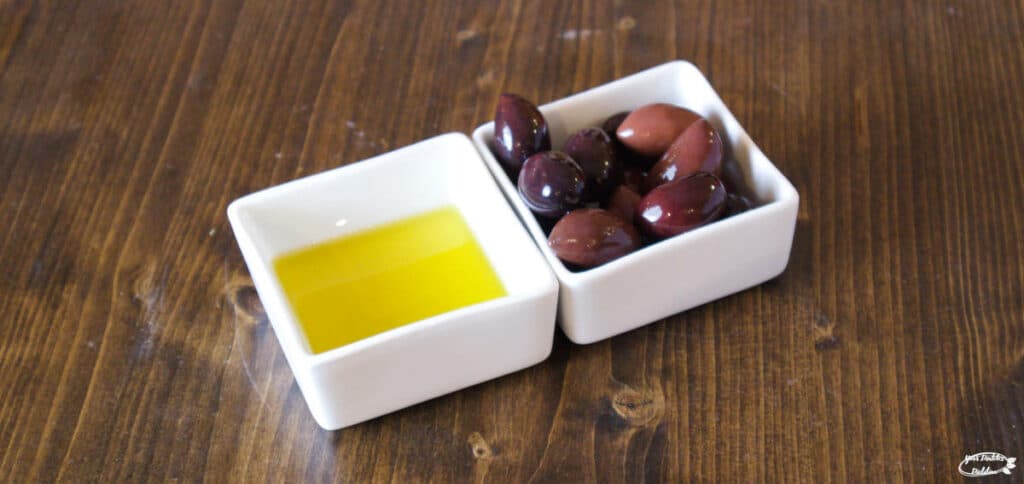
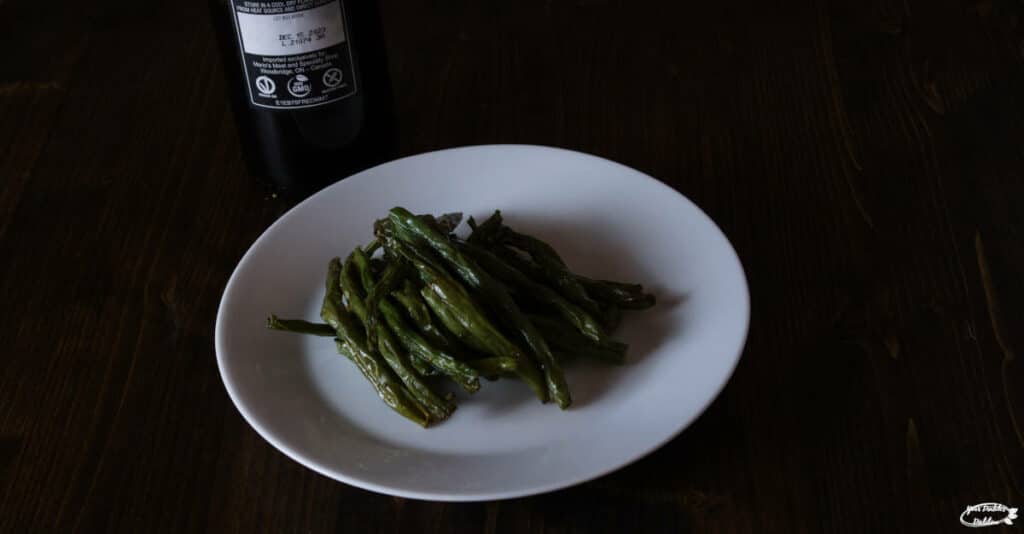
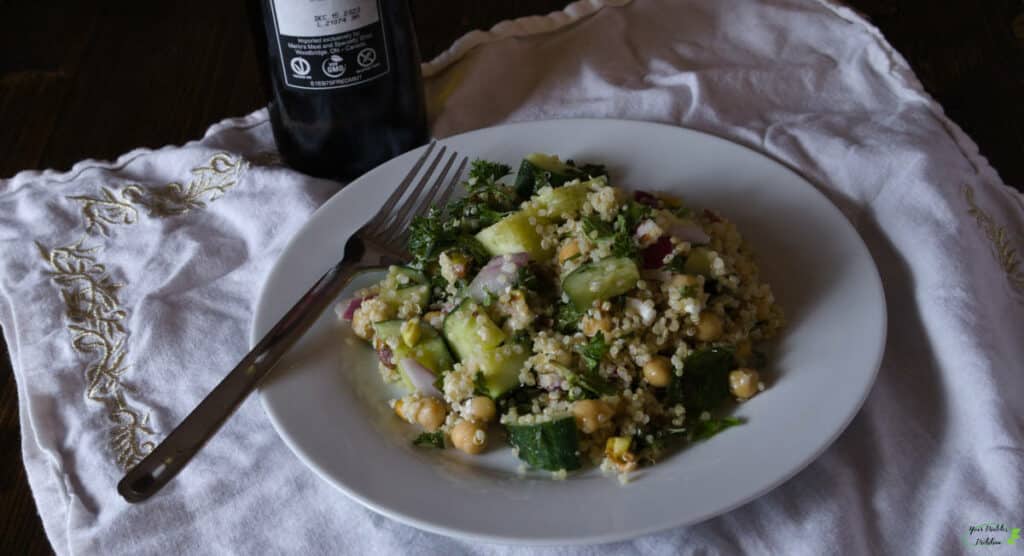
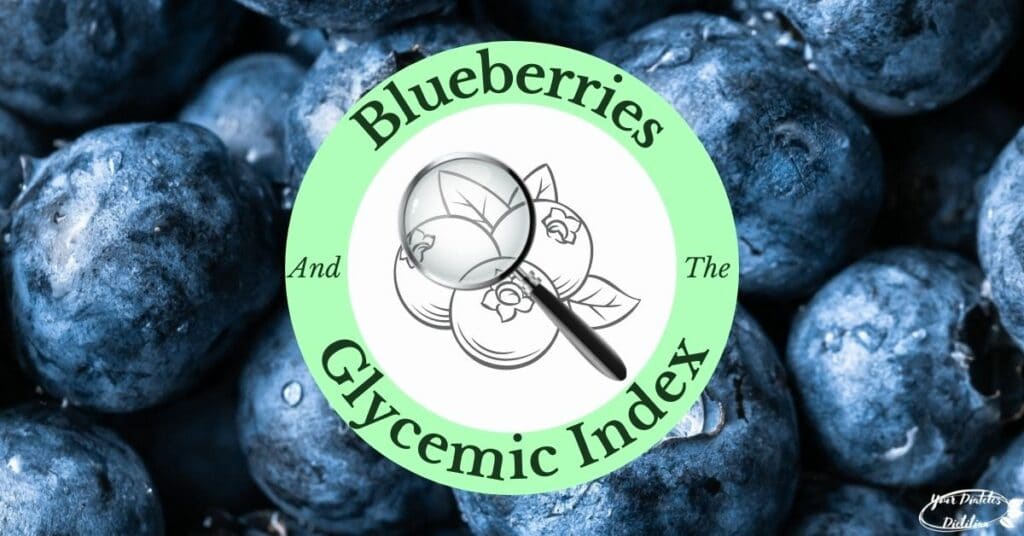
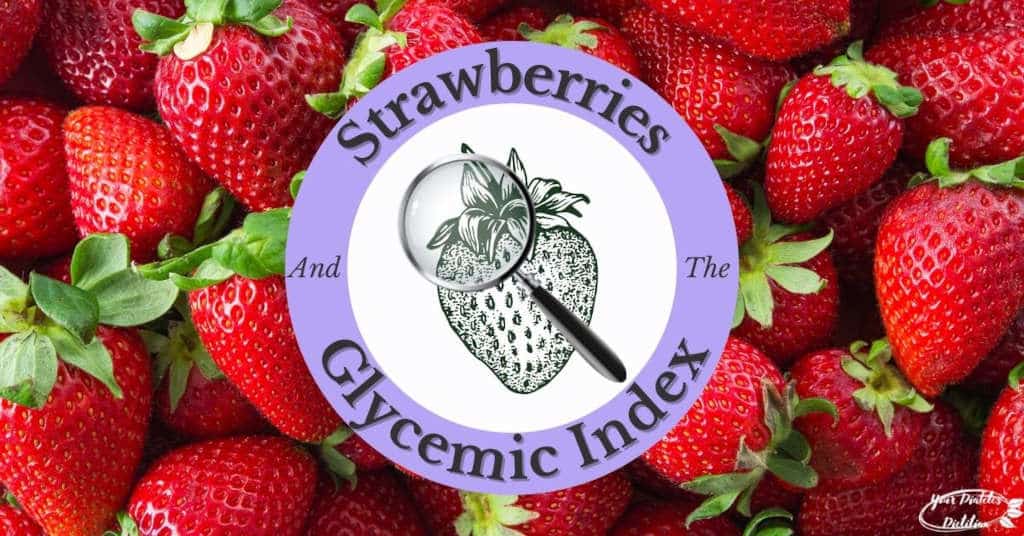
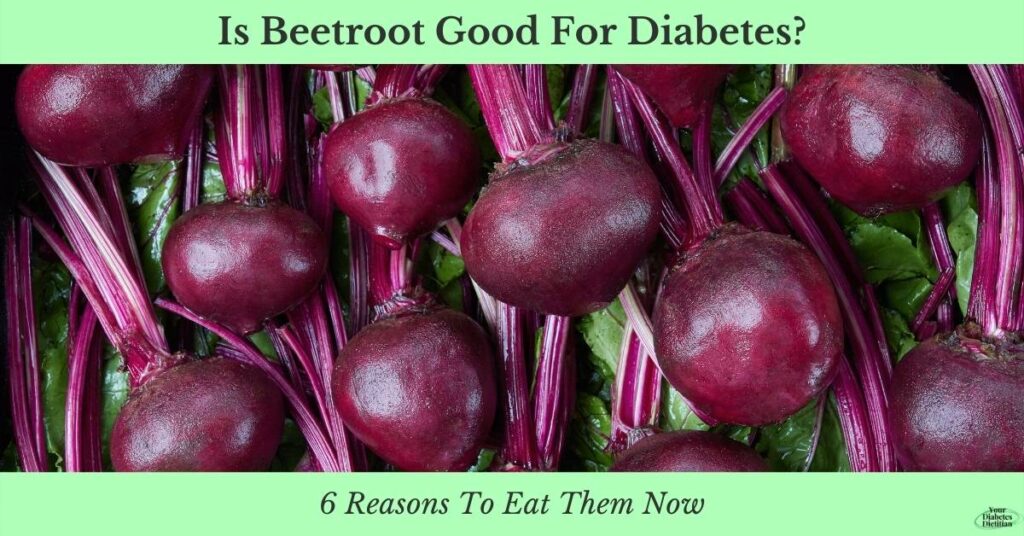

I delight in, result in I discovered exactly what I was looking for. You have ended my four day lengthy hunt! God Bless you man. Have a great day. Bye
Thanks for the marvelous posting! I certainly enjoyed reading it, you happen to be a great author.I will be sure to bookmark your blog and definitely will come back later on. I want to encourage continue your great writing, have a nice evening!